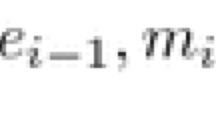Abstract
A central issue in epistemology concerns the connection between truth and justification. The burden of our paper is to explain this connection. Reliabilism, defended by Goldman, assumes that the connection is one of reliability. We argue that this assumption is too strong. We argue that foundational theories, such as those articulated by Pollock and Chisholm fail to elucidate the connection. We consider the potentiality of coherence theories to explain the truth connection by means of higher level convictions about probabilities, which we call doxastic ascent, and defend such a theory. Our defense appeals to the work of Reid and contemporary cognitive psychology in order to account for the psychological reality of higher level evaluations.
Similar content being viewed by others
Author information
Authors and Affiliations
Additional information
The authors wish to thank Keith Quillen and John Pollock for helpful comments and criticism. They note that Cohen is responsible for the criticisms of reliabilism, the coherence theory and foundationalism, and Lehrer is responsible for the articulation and defense of the coherence theory.
Rights and permissions
About this article
Cite this article
Lehrer, K., Cohen, S. Justification, truth, and coherence. Synthese 55, 191–207 (1983). https://doi.org/10.1007/BF00485068
Issue Date:
DOI: https://doi.org/10.1007/BF00485068



